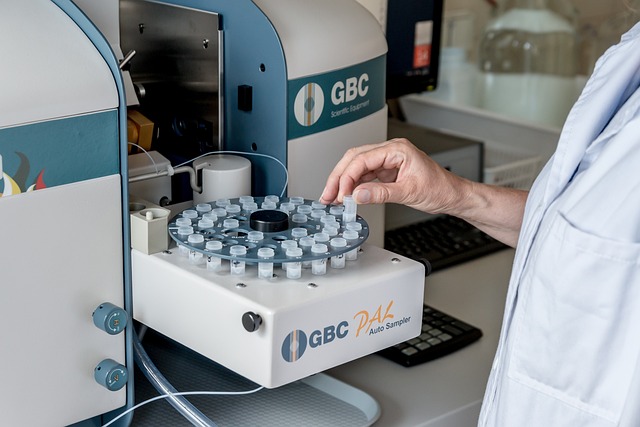Liver Function Tests (LFTs) in the UK are essential for assessing liver health, including cholesterol levels, via key metrics like ALT, AST, bilirubin, albumin, and prothrombin time. Accurate interpretation of these tests by medical professionals helps diagnose and monitor conditions from minor abnormalities to severe ones like cirrhosis or hepatitis. The UK Cholesterol Blood Test, part of LFTs, is crucial for cardiovascular health management, requiring patients to fast for 12 hours prior to ensure precise readings of total cholesterol, LDL, HDL, and triglycerides.
In the realm of medical diagnostics, liver function tests (LFTs) are indispensable tools for assessing hepatic health. For healthcare professionals, understanding LFTs—why they’re crucial and what they measure—is vital. This comprehensive guide delves into the intricacies of LFTs, with a specific focus on the UK Cholesterol Blood Test. We explore its protocol, precautions, patient preparation, and how to interpret results, helping you navigate this critical aspect of healthcare effectively.
- Understanding Liver Function Tests: Why and What They Measure
- Interpreting Results: Normal Ranges and Potential Anomalies
- UK Cholesterol Blood Test: Protocol, Precautions, and Patient Preparation
Understanding Liver Function Tests: Why and What They Measure
Liver function tests (LFTs) are a crucial set of blood investigations that provide valuable insights into the health and performance of the liver. These tests are essential tools for medical professionals to diagnose and monitor various liver conditions, as well as to assess overall liver function. In the UK, cholesterol blood tests often form part of these LFTs, giving doctors a comprehensive view of a patient’s liver health and metabolic status.
LFTs measure a range of enzymes and proteins produced by the liver, each indicating specific liver functions. For example, elevated levels of enzymes like alanine aminotransferase (ALT) and aspartate aminotransferase (AST) suggest liver damage or inflammation. Bilirubin levels, a byproduct of red blood cell breakdown, can indicate blockages in bile flow or haemolytic anaemia. Additionally, tests for albumin and prothrombin time (PT) assess protein synthesis and coagulation abilities, respectively, which are essential for maintaining normal liver function. By interpreting these results, medical professionals can identify potential issues, from simple abnormalities to more serious conditions like cirrhosis or hepatitis.
Interpreting Results: Normal Ranges and Potential Anomalies
When interpreting results of a liver function test (LFT), understanding normal ranges and potential anomalies is crucial for medical professionals in the UK. A typical LFT measures various enzymes and proteins, such as alanine aminotransferase (ALT), aspartate aminotransferase (AST), alkaline phosphatase (ALP), gamma-glutamyl transferase (GGT), total bilirubin, direct bilirubin, and albumin. These markers help assess liver health and detect potential issues.
For instance, elevated ALT and AST levels may indicate hepatic inflammation or damage, while high ALP and GGT suggest bile duct obstruction or liver disease. Total bilirubin levels above the normal range (typically below 17 umol/L) can point to impaired liver function or blood cell breakdown. Anomalies in albumin levels, often below 35 g/L, may signal poor nutrition or liver disease. Medical professionals should consider these ranges as guidelines and interpret results in conjunction with patient history and clinical presentation for accurate diagnosis.
UK Cholesterol Blood Test: Protocol, Precautions, and Patient Preparation
In the UK, the Cholesterol Blood Test is a crucial diagnostic tool for medical professionals to assess cardiovascular health and manage cholesterol levels. The protocol involves taking a blood sample from a patient after an overnight fast, typically 12 hours without food or drink (except water). This ensures accurate readings of total cholesterol, LDL (low-density lipoprotein), HDL (high-density lipoprotein), and triglycerides.
Before performing the test, proper patient preparation is essential. Patients should be informed about the need for fasting to obtain reliable results. Any medications that might interfere with cholesterol levels, such as statins or fibrates, should be considered and discussed with the patient. Additionally, ensuring a calm and comfortable environment can help reduce anxiety in patients, making the procedure smoother and more accurate.
Liver function tests (LFTs) are invaluable tools for medical professionals, offering insights into liver health. By understanding the normal ranges and potential anomalies, practitioners can effectively interpret results from UK cholesterol blood tests, enabling prompt diagnosis and tailored patient management. This comprehensive guide equips healthcare workers with the knowledge to navigate LFTs, ultimately enhancing patient care.
